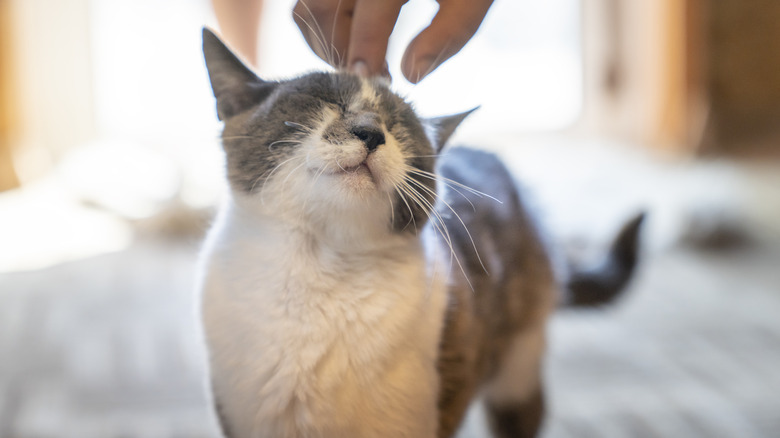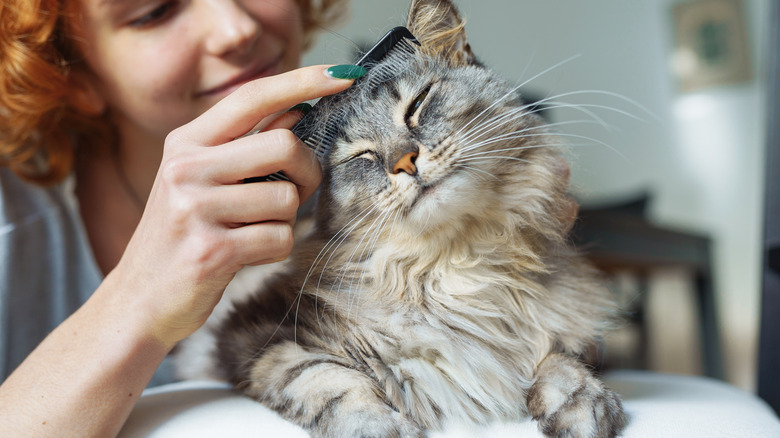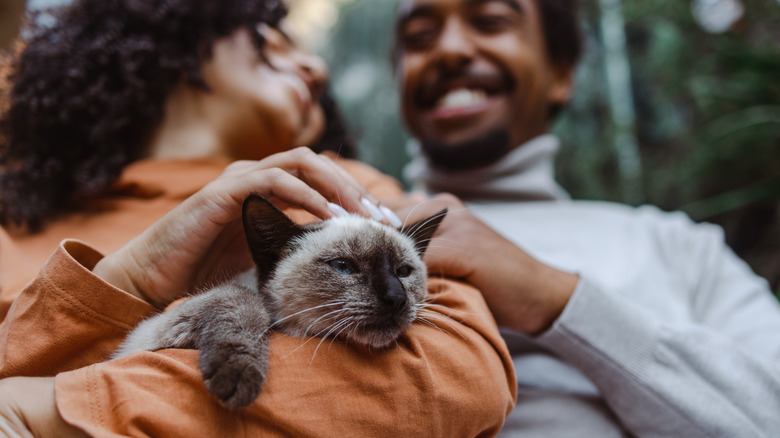3 Reasons Your Cat Doesn't Purr (And When To Be Concerned)
A cat's purr leading up to, or resulting from, a pet, scratch, or brush, is one of the most beloved sounds a kitty can make. Often, a cat's purr is a positive indicator of its mood: a greeting, a feeling of contentment, or a means to get attention from its favorite human. When a cat does not indicate its happiness through these little rumbles, it can be concerning for a cat parent.
To understand why some cats don't purr or stop purring, Joey Lusvardi, Certified Cat Behavior Consultant and owner of Class Act Cats, spoke exclusively with Cuteness to shed some light on this issue. Lusvardi gave three main reasons why a cat may not purr, starting with mentioning how it may just be in its nature: "Some cats naturally purr more than others so in many cases, it's just a normal variation of the cat's behavior." He goes on to explain that secondly, traumatic events can sometimes require patience from the owner, while not being an immediate concern, noting, "We sometimes see this if a cat has a large, stressful event happen to them where they'll stop purring for a while until they have a chance to bounce back."
Lusvardi stresses that, while not the first thing people should consider, medical or anatomical reasons could also be a third cause, saying, "If they had past trauma or injury to any of the structures involved in purring, they may be physically incapable of purring." While a non-purring cat is more likely to be caused by its personality or stressors, pet parents should be concerned if they have reason to believe that the cause is health-related.
When to bring a cat to the vet when it is not purring
The careful cat owner may want to bring their pet to the vet at the earliest signs of trouble. Yet, Joey Lusvardi emphasizes that patience is often all that is needed. In talking from personal experience, he told Cuteness, "One of my cats didn't purr for the first few months after I brought him home because he was extremely anxious, but now he purrs (and drools) all the time." On the subject of it being an indicator of a pet's happiness, Lusvardi assures, "Every cat is different and most cat behaviors exist on a spectrum," adding, "Just because your cat doesn't purr constantly doesn't necessarily mean they're unhappy."
Pet parents should try to address any potential stresses a cat faces if they believe the problem is related to mood. However, this can often be handled at home by providing an enriching environment, giving cats needed space, or avoiding overhandling them. While rare, some cats may be anatomically unable to purr because of problems with their larynx. In this case, a cat will find other ways to show affection.
Lusvardi told Cuteness that you should take a cat to a vet when "...any sudden change in behavior [is] paired with other behavior changes [that] could be a cause for concern." A cat who becomes less vocal overall, begins to hide, and stops eating may have medical issues. Laryngeal disease, which can come with difficulties vocalizing, drinking, or eating due to larynx inflammation, will also be a reason to bring a cat to a vet. Awareness of common cat illnesses can also help a kitty caretaker determine when a pet's behavior points to signs that they need to be seen by a veterinarian. Considering medical issues is essential, but a cat's lack of purring behavior is not cause for concern most of the time.
Is a cat's purr always positive?
While a cat's purr is almost always an indicator of happiness, there are a few cases where it can be used as a coping mechanism. Purring can be comforting for a kitty, so sometimes it uses it to cope with anxiety; some pet parents will notice rumbles after a vet visit as their cat tries to de-stress. This method of self-soothing may also apply to sickness as a means to help deal with pain or discomfort; it is not unheard of for a cat to purr before a medical procedure. Kittens are also unique in using their little rumbles and often purr constantly while eating. In this case, a pet parent should enjoy the chaotic adorableness on display.
Cat language can be challenging for new and even seasoned pet parents to comprehend. To help unravel the complex cat language, check out the video above that Joey Lusvardi shared with Cuteness. A cat's purr is a happy thing in most cases, but knowing when to look for issues can help ensure its purrs stay positive.
Always consult your veterinarian before making changes to your pet's diet, exercise, or care. To find an accredited veterinarian in your area, you can search the American Animal Hospital Association's online database.


